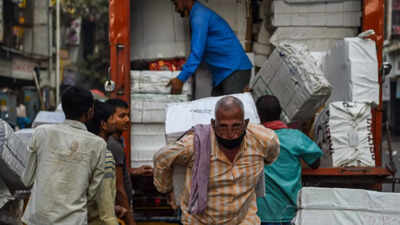[ad_1]

NEW DELHI: The World Bank on Wednesday lowered India’s gross domestic product (GDP) forecast for financial year 2022-23, citing impacts of the Russia-Ukraine crisis.
In its report titled ‘Reshaping norms: A new way forward’ which focusses on South Asian economy, the international lender lowered its growth estimate for India to 8 per cent from 8.7 per cent for the current fiscal year. It also cut by a full percentage point the growth outlook for South Asia, excluding Afghanistan, to 6.6 per cent.
In its January growth outlook, the World Bank had projected India’s economy to grow by 8.7 per cent in FY23.
“In India, household consumption will be constrained by the incomplete recovery of the labor market and inflationary pressures,” the report said.
It further noted that even though countries like India and Maldives have seen their overall fiscal deficit fall in 2021 as compared to 2022, deficits are still higher than pre-pandemic levels.
The report also highlighted uneven recovery across sectors in India.
On the supply side, the mining sector benefited from rising global commodity prices and expanded in both Q3 and Q4 of 2021. However, manufacturing expanded in Q3, riding on increasing external demand but remained static in Q4 as the Omicron wave impacted global demand and rising input costs reduced margins.
Meanwhile, services expanded in both quarters but remained below pre-Covid levels, it said.
On the demand side, the report said, growth in private consumption was supported by a release of pent-up demand during the Delta wave, while investment was crowded-in by increased government capital spending.
Imports and exports remained the fastest growing sectors in both Q3 and Q4, with higher growth in imports than in exports,
contributing to current account deficits, it added.
Besides, the report projected a relative slowdown of growth in India in first quarter April-June 2022 in comparison to previous quarters as the low base effects of 2020 wear off.
In terms of impact of war on financial markets in the region, the report said equity markets in India, Pakistan, Bangladesh, and Sri Lanka fell sharply following the February 24 invasion of Ukraine.
“While most of the initial losses have been recovered, all equity indexes except for India’s are still below their pre-war levels,” it said.
In a statement, Hartwig Schafer, World Bank vice-president for South Asia said: “High oil and food prices caused by the war in Ukraine will have a strong negative impact on peoples’ real incomes.”
In terms of other economies in Asia, World Bank slashed this year’s growth forecast for Maldives to 7.6 per cent from 11 per cent, citing its large imports of fossil fuels and a slump in tourism arrivals from Russia and Ukraine.
It raised crisis-hit Sri Lanka’s 2022 growth forecast to 2.4 per cent from 2.1 per cent but warned the island’s outlook was highly uncertain due to fiscal and external imbalances.
For Pakistan, World Bank raised its growth forecast for the current year ending in June, to 4.3 per cent from 3.4 per cent and kept next year’s growth outlook unchanged at 4 per cent.
[ad_2]
Source link
